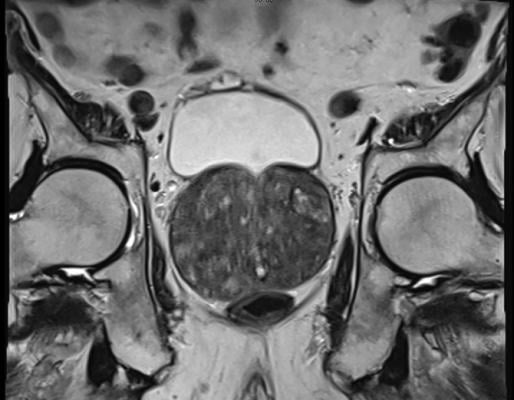
Benign Prostatic Hyperplasia (BPH) or prostate adenoma seen on MRI examination. Getty Images
February 17, 2022 — An interim analysis of an ongoing Phase III study from UCLA Jonsson Comprehensive Cancer Center indicates that using magnetic resonance imaging (MRI) to guide precisely-focused high-dose radiation treatment for prostate cancer reduced side effects associated with the treatment. The findings are being presented at the 2022 ASCO Genitourinary (GU) Cancers Symposium in San Francisco, California.
Advanced radiation techniques like high-dose stereotactic body radiotherapy (SBRT) offer the opportunity to deliver high radiation doses to tumors while sparing surrounding tissues. Clinicians often use computed tomography (CT) to help make sure the dose is delivered with precision. MRI offers several theoretical advantages over CT to guide SBRT for prostate cancer, including the ability to aggressively reduce planning margins needed for radiation due to enhanced imaging capabilities.
For the current study, men undergoing SBRT for localized prostate cancer were randomly assigned to either CT-guidance or MRI-guidance. Investigators planned to compare the groups to see how often men suffered serious side effects, called toxicities, over the next 90 days after treatment. The investigators believed they would need to enroll 300 patients to be able to detect a benefit to MRI-guidance, but had planned to analyze the data after 100 patients were treated in order to see if this hypothesis were true or if fewer patients might need to be enrolled.
In this analysis of the first 100 patients treated, the investigators found that men undergoing MRI-guidance were less than half as likely to experience Grade 2 genitourinary (GU) toxicity (22% vs 47%), like frequent urination, burning sensation while urinating, bloody urine, or urinary incontinence. And while a significant proportion of men who had CT-guidance suffered gastrointestinal (GI) toxicities, such as diarrhea, discharge, or rectal/abdominal pain to abdominal distention or obstruction, none of them men undergoing MRI-guidance did so (14% vs 0%).
“MRI-guidance offers a statistically significant reduction in acute grade GU as well as GI toxicity for prostate SBRT,” said Dr. Amar Kishan, vice chair of clinical and translational research in the Departments of Radiation Oncology and Urology at UCLA Health Jonsson Comprehensive Cancer Center. “Because of the significant effect size we saw, we were able to cut our projected sample size in half. Thus, we finished enrolling on our trial in October 2021. Our final results are expected later this year, but we are extremely optimistic by what we’re seeing, and hope this technology will soon begin to offer men undergoing radiotherapy for prostate cancer better outcomes.”
For more information: https://www.uclahealth.org/


 December 11, 2025
December 11, 2025 









